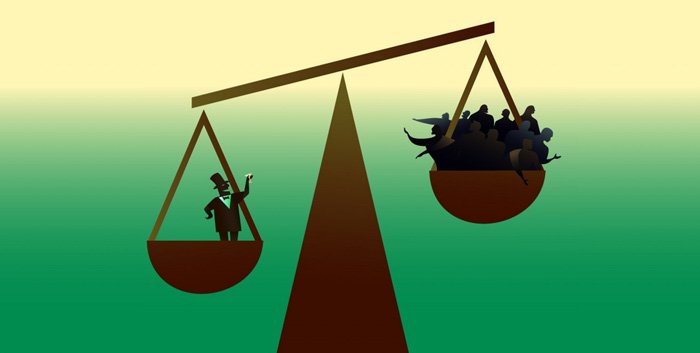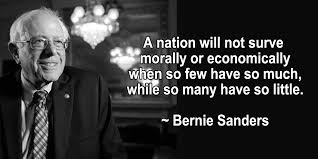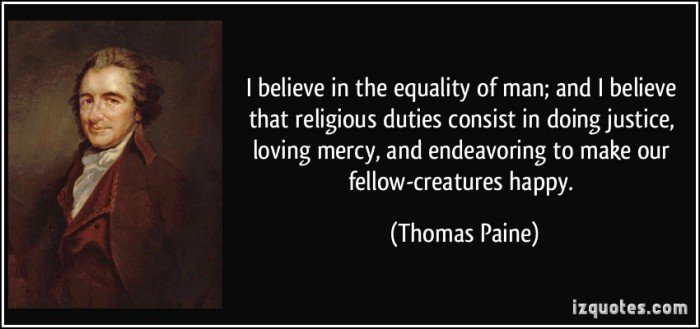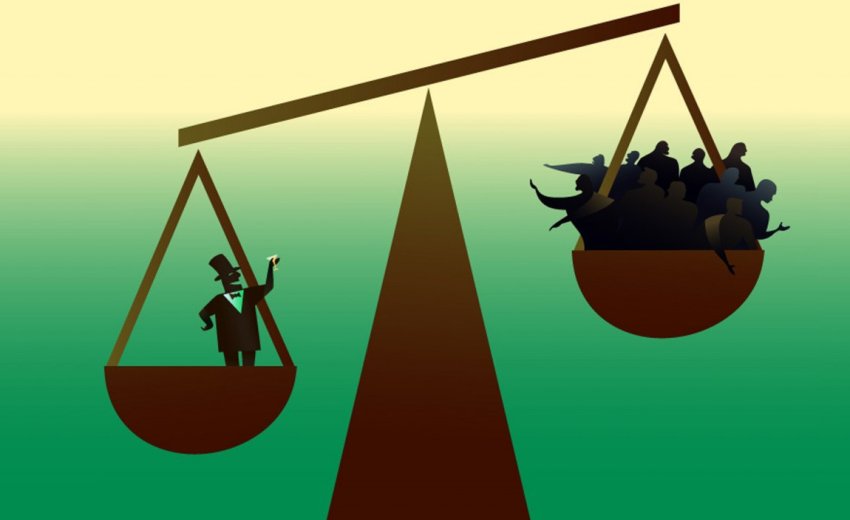
EQUALITY & INEQUALITY
I.J. Singh & Ravinder Singh Taneja
According to our Constitution, the document upon which the USA was founded, life, liberty and the pursuit of happiness are immutable God-given rights to each and every one of us. After all, aren't we the chosen species of God's handiwork? The American vision treats Equality as a self evident attribute.
And yet, the dominant and recurring theme throughout history has been the struggle between equality and inequality - real or perceived. Look around the world today and you will see that the sense of inequality, of feeling less than the other, occupies center stage. In America, Donald Trump is cleverly exploiting this sense of inequality that a growing segment of White Americans feel after centuries of being dominant, while economists worry about the growing wealth gap between the haves and the have-nots.
In India, the treatment of low caste untouchables (Dalits) is an inflammatory but undeniable reality that some Hindus pretend never existed. Then there is the question of what to do with so-called Middle Eastern migrants (refugees) that are inundating Europe. Mostly have-nots, they have everyone all riled up.
Keep in mind that the politico-social reformers and revolutionaries who talk of this persistent inequality do so from a perspective where some are more equal than others. There is always the super-endowed one percent in every culture.
There are two distinct aspects to inequality: that of talent and ability on one hand, and of opportunity on the other. While ability, one could argue, is inherent and God given, opportunity should be and is a societal onus and responsibility. While the former is housed in our individual DNA, the latter is a human construct that gives meaning to our whole struggle in societal existence.
Yes, we can create opportunity that appears unbiased and guarantees the same legal rights for all, but the results depend on how the moment is seized, understood and applied. Not everyone will use the same opportunity equally, not only because the DNA is different but also because the finer points of how one seizes opportunity may be culturally or economically driven.
Legally we may promise equality of opportunity, but opportunity often emerges from human interaction and networking. One can't always methodically and predictably prepare for opportunity; it comes in a myriad ways and also like a stroke of luck from nowhere - religious believers might call it grace. There is thus no way to forcefully mandate equality - legislatively or otherwise.
Both Experimental Biologists and Behavioral Scientists tell us that it is the intricately complex and life-long interaction of nature (DNA) and nurture (environment) that shapes us, our successes and failures. This makes us what we are.
Some societies override such concerns by promising that each of us receives according to our needs and gives according to our abilities. But this axiom cannot be satisfactorily legislated. And who will decide what to take and how much to give becomes an explosive question.
Many utopian societies that human history documents have failed; nevertheless, they all noted the inequality in human potential, such that we can never totally correct nor compensate for these inadequacies.
Hence the truism that human societies have always been split into rulers and serfs, leaders and followers, kings and slaves. Inevitably then there is always a gulf or stratification in human societies; this becomes history's enduring lesson.
Indeed, hierarchies appear to be Nature's organizing principle. They are visible not only in human societies but in the animal world as well. Hierarchies abound in the structure of the Universe itself - from societal systems and information sciences, to cellular and sub-cellular biology, and to the structure of the gene itself. Life appears to be inherently hierarchical.
Why, one might ask, is such an arrangement so pervasive? Human survival and evolution apparently depend upon it. Increasingly complex structures appear to organize in hierarchies.
This never ending tug of war, back and forth in the vertically stratified units of society, particularly in economic terms, have for centuries given birth to periodic human potential movements. Their goal is to provide equal opportunities and rights to the have-nots and narrow the gap between vertically stratified strata in the face of ever present gaps in talent.
Many Utopian movements are religious at their core, but some are not. Of the latter, Socialism, and Communism, along with smaller groups with experimental lifestyles might count. If you don't think of deism as an essential prerequisite of religions, many of these such as Communism deserve to be counted as religions. (It all depends on our definition of "religion.") Deist religions start with a just, forgiving Creator who treats the believers with a kindly generous eye; redemption from our transgressions is promised, if not in this world, then in another reality after death. The non-believers or those of other faiths are usually not included in such largesse.
M.I.T. economist Daron Acemoglu and Harvard political scientist James Robinson, in their book Why Nations Fail (2012) offer an interesting argument in favor of inclusiveness, claiming that throughout history, nations that were not economically and politically inclusive failed. Exploring throughout history, the authors concluded that countries that become internally too unequal go into decline.
 When wealth becomes unequal, so the argument goes, the wealthy consolidate their power, democracy is undermined, and the nation - including its economy - starts to disintegrate. The rich undermine their own good fortune by being too greedy!
When wealth becomes unequal, so the argument goes, the wealthy consolidate their power, democracy is undermined, and the nation - including its economy - starts to disintegrate. The rich undermine their own good fortune by being too greedy!
Watch the political oratory of wannabe leaders in this political season and the trouble brewing for the top one percent of financial tigers in contemporary American society. Does that sound like Bernie Sanders on his pulpit?
The moral: Human societies operate largely as vertically constructed, somewhat pyramidal structures, with authority concentrated at the top. But liberal, inclusive societies recognize these limitations and focus on enlarging the opportunities for achievement.
In this mix of rulers and serfs who is wise or strong enough, while also being caring enough to be anointed the ruler? What does life teach us? How does history inform us? How does religious philosophy, specifically Sikhi, instruct us? Finally, what are the lessons for the day?
Keep in mind that the underlying issue is equality of opportunity, not achievement. Transforming a possible opportunity into an action item is a whole new and different ball game. Seize the day (carpe diem) may be the only feasible advice.

Utopian visions - the notion of a perfect political and social system - have been with us since the beginning of Time. Man's expulsion from the Garden of Eden may have set in motion this downward spiral. Since then, Plato's Republic, Cicero, Dante and St Augustine, not to mention Thomas Moore have all envisioned a Utopia, a sort of pilgrimage back to Paradise - that is until utopia became dystopia.
Sikhism, too, remains a powerful idea of a human potential movement.
The Sikh position on Equality is unambiguously stated in its creedal statement, the so-called Mool Mantar: Oneness underlies all the diversity in the Universe. Sikh tradition tells us that Guru Nanak's enlightenment was accompanied by the assertion, "Na ko Hindu, Na Mussalman" meaning that there is no Hindu or Muslim, thus signifying the equality of all.
It is on this foundational principle of Oneness that Guru Nanak offered a new vision, a new Way of political governance. The bards, Satta and Balvand describe Guru Nanak's vision as the citadel of Truth and a reversal of the flow of the Ganges (a river sacred to Hindus), no doubt an allusion to the fact that the Guru's new paradigm dismantled and turned upside down the existing stratified socio-political structure of India.
And this was over 500 years ago.
After his long and extensive travels, in 1521, Guru Nanak founded Kartarpur, a commune, in present day Pakistan not far from the Indian border. This experimental township was the practical application of the Guru's vision of a Utopia and it is here that the foundation of Sikh society was established.
Bhai Gurdas offers us a glimpse of Kartarpur. Here the Guru put his philosophy into practice by combining kirat and keerat - literally meaning honest labor, working together in the fields during the day, and singing the praises of the One, sitting together in the morning and evening darbars. What that meant was to be productive as we cultivate our God-given talent.
A powerful practice that served as a great equalizer was the Pangat or communal kitchen. By requiring everyone to partake from a common communal kitchen, the Guru took straight aim at the heart of a stratified caste system where the kitchen (with its segregation by caste) was the centerpiece.
The institution of Pangat (also called Langar) is one practice that distinguishes Sikhs today.
Guru Nanak's strong reaction to the political and economic corruption of his times is an instructive insight into his vision of an equitable society. He did not shrink from calling out the rulers of the day, likening them to wolves and butchers, "Rajje Seeh Mukkadam Kuttey" (Guru Granth p. 1228) - reminding to us to find our voice and give it expression.
How did Sikhi's message resonate with people? A clear example is when Guru Gobind Singh initiated the order of the Khalsa. After initiating the first five Sikhs he knelt before them and asked them to initiate him. The inherent idea here was of equality and self-governance; the differences between the Guru and the have-nots vanished. This was the institutionalization of Guru Nanak's message.
We submit that this message of Sikhi is as alive today as it was five centuries ago. Sikhi offers it today as it did then.
Think a moment: Most opportunities arise from differences of opinion. But diversity also fuels growth. We need to cultivate the art of conversation and dialogue along with learning how to disagree without becoming disagreeable. Guru Nanak emphasized openness of dialogue and communication as sure ways to break down walls of inequality and hate. The Guru Granth reminds us that he set the example himself in the discourse with the Yogis. Jab lag duniya rahiye/Nanak kich suniye kich kahiye," (As long as this world exists, O' Nanak, Let us listen and let us say something.)
We need to remember that competition is not bad; greed and avarice are evils that need to be discarded from our arsenal.
Equality and fraternity of opportunity, not necessarily of results is the goal. Notwithstanding Bernie Sander's now finished political crusade we likely cannot banish inequality absolutely. When we speak of life liberty and pursuit of happiness, we need to note that the operative word here is "pursuit" not attainment. Remember that different children of the same parents differ in talent, temperament and results
Some believe that have-nots are at the bottom of the unwanted pile because of how they sinned in their past lives but that's a road best not taken. It makes one so smug and satisfied that we tend to hop off the road of enterprise and to walk instead the path of indifference and complacence.
[email protected]
[email protected]
2016
